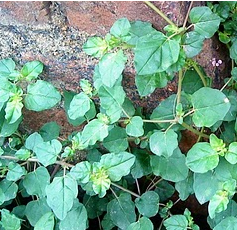
Punarnava is a common prostate, water-loving, creeping weed, which grows throughout the warmer parts of India on sandy and rocky soil. Punarnava means ‘one that renews the old body’. There are two varieties of Punarnava; red-Raktapunarnava and white-Shwetapunarnava. It is a good diuretic and heart tonic.
Benefits of Punarnava: A good herb for kidney stones. White-Anemia, heart disease, cough, intestinal colic, kidney disorders. Red-Heart disease, nervous disorders, piles, skin diseases, edema, chronic alcoholism, insomnia, arthritis, eye diseases, asthma, jaundice, kidney disorders, liver diseases.
Action: Bitter, stomachic, laxative, diuretic, expectorant, rejuvenative, diaphoretic, emetic.
Scientific name: Boerhavia diffusa.
Useful part: Leaves, root.
Dosage: 1–10g per day dried or 3–15ml per day.
Energetics
Rasa (taste): Bitter
Vırya(energy): Cooling
Vipaka (post-digestive effect): Pungent
Guna (quality): Dry, light
Dosa effect: VPK−, V+ in excess
Dhatu(tissue): Plasma, blood, fat,nerve, reproductive
Srotas (channel): Digestive, urinary, plasma
Classical and common names
Ayurvedic: Punarnava, Raktapunarnavaa(Red variety), Shwethapunarnava(white variety), Katthilla, Shophaghni, Shothaghni, Varshaabhu, Shothahrit, Vrishchira.
English: Spreading Hogweed.